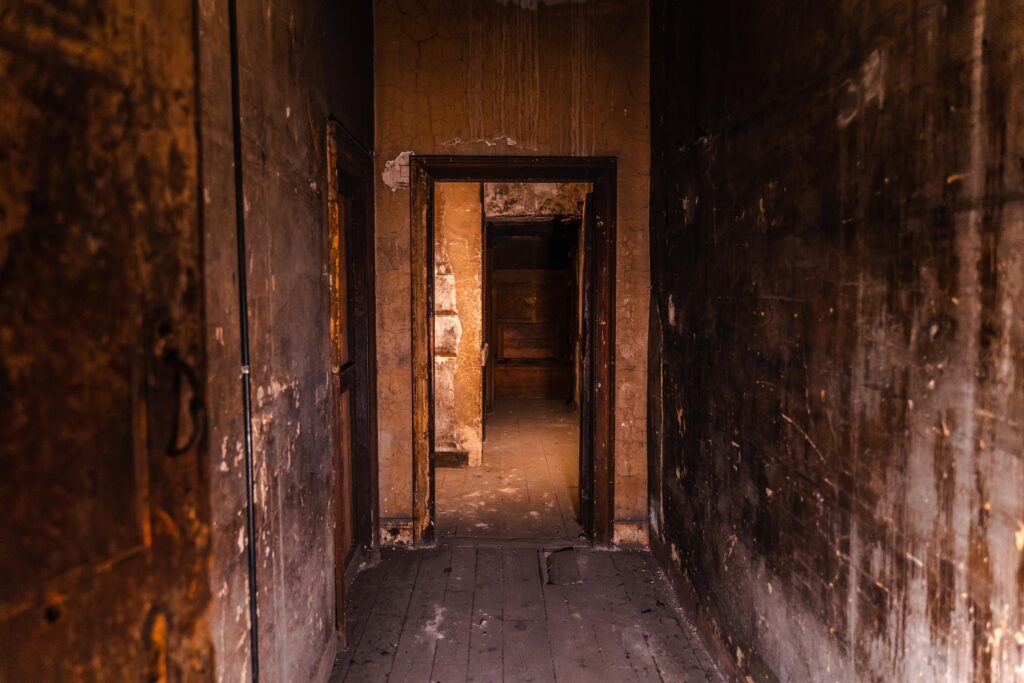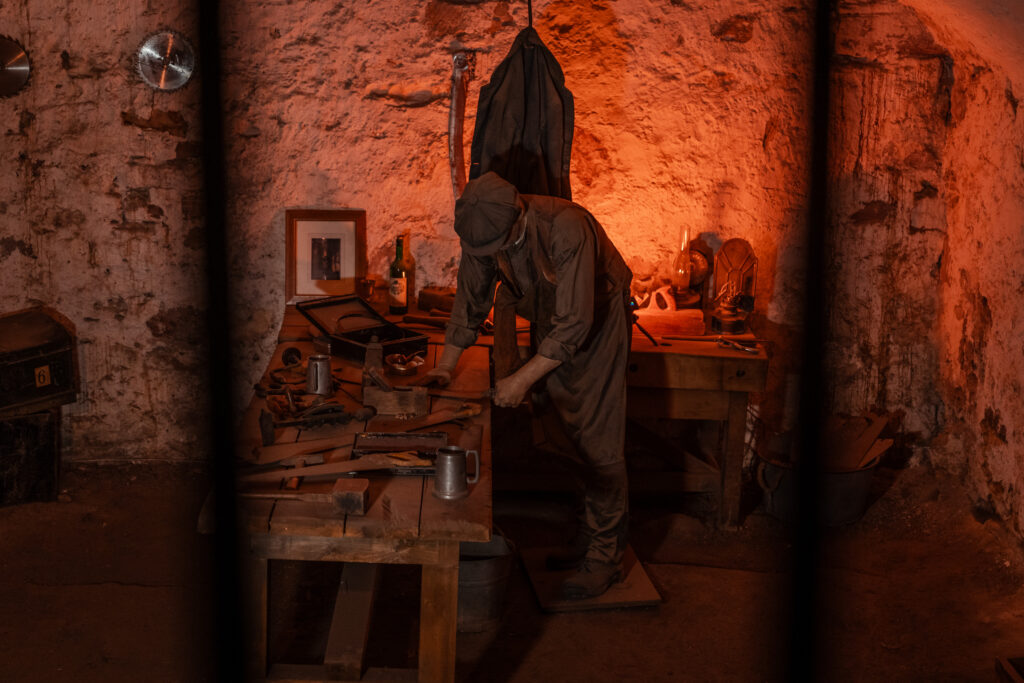Iconic Mary King’s Close Residents’ Forgotten Gravestone Restored by Volunteers

Blog article written by the Friends of Dalry Cemetery
Janet and David Chesney, the last residents of Mary King’s Close, now have their gravestone restored to its former glory thanks to dedicated volunteers.
Located in Dalry Cemetery, within the Gorgie/Dalry area of the city, the Chesneys’ burial site fell into disrepair following the closure of the Edinburgh Cemetery Company in the 1970s. Over the years, the cemetery suffered extensive vandalism until Edinburgh District Council assumed ownership in 1988 through a compulsory purchase order.
More than a century after Janet’s passing, the Chesneys’ gravestone, along with numerous others, lay neglected amidst overgrowth, barely legible. However, the Friends of Dalry Cemetery volunteer group, fueled by donations, recently enlisted the expertise of professional stonemason John Burrell to restore the monument.
Today, visitors to Dalry Cemetery can once again appreciate the Chesneys’ memorial, a testament to the dedication of community volunteers in preserving Edinburgh’s rich history.

Eryk Jan Grzeszkowiak, Friends of Dalry Cemetery volunteer:
“During the volunteering sessions we often remark how most people associate cemeteries with death. Dalry Cemetery, however, is now very much alive. Every time an old monument is restored, cleaned or researched we get one step closer to bringing back the memory of those who came before us. In words of a poet, W. Szymborska “The eternity of the dead lasts as long, As one keeps paying them with memory”.”
About the Chesneys
Carol Stewart, Friends of Dalry Cemetery researcher:
David Chesney – also known as David McKean Chesney – was born around 1798 in the parish of Kirkmabreck in Kirkcudbrightshire on the southwestern coast of Scotland. It is not clear who his parents were, although it is possible that his father’s surname was McKean. David Chesney became a sawmaker.
Janet Cowan was born in Rothesay, on the island of Bute, to Robert Cowan and his wife, Jane Duncan. Janet was baptised there on 1 June 1806.
Janet’s son, Andrew Cowan Ramsay was born on 16 January 1831 in Rothesay and was baptised on 21 February of the same year. His father was called William Ramsay and he came from Glasgow. It appears that Andrew’s parents never married but after his mother married David Chesney on 9 March 1839, in the Gorbals district of Glasgow, Andrew took his stepfather’s surname. It appears that there were no children born to David and Janet Chesney after marriage.

The 1841 Census indicates that the Chesneys were then living in the St Ninian’s district of Stirling but by 1851, they had moved to Edinburgh. The 1851 Census states their address as Mary King’s Close. Mary King’s Close was one of a network of closes running off the High Street in Edinburgh’s Old Town, upon which the Royal Exchange Building was partially built in the 1750s. This meant that the premises were substantially located underground.
On the 1851 Census, David’s occupation is stated as Master Sawmaker and the information indicates that he employed two men. Also appearing on this census was their lodger, an apprentice sawmaker called David Inglis.
Interestingly, Andrew Chesney, who worked with his father, was not living with his parents at that time but instead appears on the 1851 Census, living at a boarding house in Edinburgh’s Bread Street. It is possible that Andrew boarded at a boarding house in order that the Chesneys could earn additional income from renting a room to a paying lodger – in this case, their apprentice.

On 16 November 1860, Andrew Chesney was married to Margaret Marshall at 24 Grove Street in Glasgow. Margaret’s father was James Marshall, a shoemaker and her mother was Isabella Williamson. After marriage, Andrew brought his wife to live with him in Edinburgh.
David and Janet Chesney continued to reside in Mary King’s Close throughout the 1860s and 1870s; however, by then, their home and shop address was identified as 8 Royal Exchange. The 1871 Census indicates that David Chesney was now retired and their son Andrew was running the saw-making business. By 1875, it appears that David Chesney had acquired property in Edinburgh, owning residential premises at 11 Middle Arthur Place on Edinburgh’s Southside.
Janet Chesney

Janet Chesney died on 17 November 1882, aged 76 years, at 8 Royal Exchange, Edinburgh. The cause of her death was stated to be bronchitis, from which she had been suffering for around 5 years and general debility from old age. The informant of her death was her son Andrew. She was interred in a private plot (R. 204) in Dalry Cemetery on 20 November 1882.
David Chesney

It was only some years after the death of Janet Chesney, that David Chesney vacated the premises at 8 Royal Exchange. The Valuation Rolls, which were local taxation records, listing people and properties in Scottish counties and burghs, indicate that he was still living there in 1885, however it appears that he was eventually the last remaining occupant to vacate before the residential and business premises of the Royal Exchange were sealed off.
By 1885, David Chesney had acquired further properties in Edinburgh – at Spittal Street and at Montague Street in Newington. Andrew and Margaret Chesney lived in Spittal Street for most of their married life but they had no children.
David Chesney seems to have retired to live in Rothesay, on Bute where he appears on the 1891 Census and it was there that he died on 9 August 1892 at 11 Bridgend Street. The names of his parents are not recorded on his death record and the cause of his death was simply stated as “infirmity”. The informant of the death was his son, Andrew. David Chesney was interred with his wife Janet in Plot R.204 in Dalry Cemetery on 11 August 1892. At the time of his death, the value of his estate was estimated to be £777 5s 4d, which at that time was a very large sum of money.
Andrew Chesney
Andrew Chesney died on 3 October 1906, aged 74 years, at 34 Thirlstane Road, Edinburgh. He had been suffering from hemiplegia – presumably as the result of a stroke – for almost three years at the time of his death. On 6 October 1906, he was interred in the Edinburgh Metropolitan cemetery (Plot I. 474), now known as Morningside Cemetery.
The informant of his death was William Naysmith Marshall, his nephew. William had taken over the saw-making/repairing business which he operated from around 1895 until approximately 1930, in premises at 5 Upper Bow, which is situated on the Royal Mile, close to Castlehill.
Andrew’s widow Margaret died on 22 January 1918 at 33 Comiston Drive. The cause of her death was senile arteriosclerosis. She was also interred in Morningside Cemetery, in the plot shared with her husband Andrew, on 26 January 1918. The informant of her death was her nephew, William Marshall.









